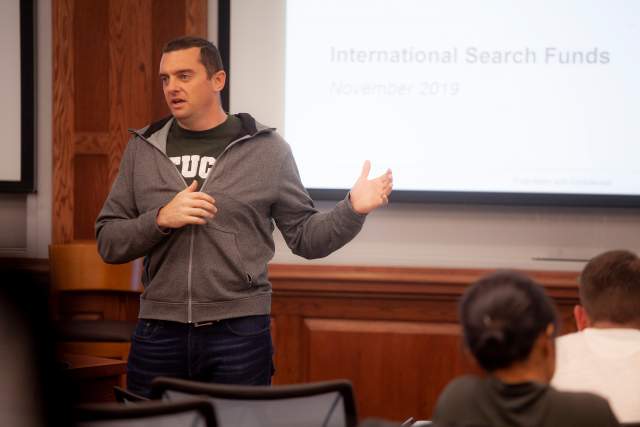The Aspen Institute announced recently that it has selected the Tuck course Leadership in the Global Economy, which is taught by Dean Matthew Slaughter, for one of its 2019 Ideas Worth Teaching Awards.
The Ideas Worth Teaching initiative was developed by the Business and Society Program within the Aspen Institute to “draw attention to important new ideas about the role of business in creating a sustainable, inclusive society,” according to the Institute’s website. The awards are given annually to celebrate visionary teaching at business schools, and the winners are selected from a competitive pool of nominations by Aspen Institute staff in consultation with academic advisors.
In LGE, we harness the trust and support that Tuck students forge in their shared first-year core experience as a foundation for building their ability to articulate ideas and constructively disagree about them.
Slaughter, the Paul Danos Dean and the Earl C. Daum 1924 Professor of International Business, created the second-year elective Leadership in the Global Economy to give students a chance to apply lessons from the first-year core curriculum to contemporary business issues. It uses a unique format where students take on the role of CEOs of globally-engaged companies testifying before the U.S. Congress or a similar government entity around the world, presenting their viewpoint to other students in five-minute prepared statements. When the testimony is finished, students answer cross-examination questions from their classmates to further articulate and defend their perspective. Through this dialogue, students work on their abilities to articulate and defend a point of view, and to constructively disagree with others. “Constructive disagreement is often necessary for teams and organizations to coalesce disparate ideas into a unified plan,” Slaughter says. “In LGE, we harness the trust and support that Tuck students forge in their shared first-year core experience as a foundation for building their ability to articulate ideas and constructively disagree about them. Without this essential ingredient of trusting support among students that Tuck uniquely creates, LGE could not thrive the way it does.”
LGE addresses topics at the “fusion of the global, digital, and social forces in the world economy.” This setting, a little more than a decade after the World Financial Crisis, presents significant business and economic opportunities—“and yet serious pressures and anxieties as well,” Slaughter says. In fall 2019, the topics of LGE hearings included the U.S.-China trade war, global climate change, immigration policy, and rising inequality of income, wealth, and opportunity. To prepare for each session, students read a combination of academic articles, policy reports, and current readings from periodicals including The Economist, Bloomberg Business Week, The Wall Street Journal, The Financial Times, and The New York Times.
In selecting LGE for an Aspen Award, the Institute praised the way Slaughter inspires students to imagine and articulate possibilities, and how he prompts them to think about an important question for MBA students today: “how will you manage and lead global companies or organizations in environments with wary governments and skeptical societies?”
“Leadership in the Global Economy, like all of our leading-edge electives, reflects both the timely and timeless character of learning at Tuck,” says Slaughter. “I am humbled to receive this important recognition, and I am honored to partner with LGE students on their journey to becoming wise, decisive leaders who better the world through business.”

